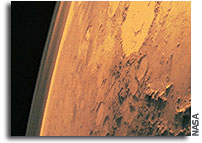NASA: How To Fly To Mars and Beyond in Weeks Instead of Months

HAMPTON, Va. – Humans may step on the interstellar gas pedal some day and “Boom!” goes the engine.
On Tuesday, April 2, at NASA’s Langley Research Center, theoretical physicist Friedwardt Winterberg will present, “To Mars in Weeks by Thermonuclear Micro-Bomb Propulsion,” at 2 p.m. in the Reid Conference Center here.
Winterberg will be available to answer questions from the media during a news briefing at 1:15 p.m. that day. Media who wish to do so should contact Chris Rink at 757-864-6786, or by e-mail at chris.rink@nasa.gov, by noon on the day of the talk for credentials and entry to the center.
That same evening at 7:30, Winterberg will present a similar presentation for the general public at the Virginia Air & Space Center in downtown Hampton. This Sigma Series event is free and no reservations are required.
Winterberg will discuss the rewards and challenges of a nuclear bomb propulsion system – the preferred candidate for an impulse-high thrust system in spacecraft. His second approach to interstellar travel would be mastering the production and storing of antimatter that could lead to matter-antimatter laser propulsion. The first system could yield speeds about one-fifth the velocity of light. The second and more difficult would be closer to the speed of light or 186,000 miles per second.
Winterberg is a theoretical physicist and research professor at the University of Nevada, Reno. With more than 260 publications and three books, he is known for his research in general relativity, Planck scale physics, nuclear fusion and plasmas. His work in nuclear rocket propulsion earned him the 1979 Hermann Oberth Gold Medal of the Wernher von Braun International Space Flight Foundation and a 1981 citation by the Nevada legislature.
He is also an honorary member of the German Aerospace Society Lilienthal-Oberth. He received his Master of Science degree from the University of Frankfurt and his doctorate in physics from the Max Planck Institute as a student of Werner Heisenberg — the German theoretical physicist who was awarded the Nobel Prize in Physics in 1932 for the creation of quantum mechanics.
For more information about NASA Langley’s Colloquium and Sigma Series Lectures, visit: http://shemesh.larc.nasa.gov/Lectures/









